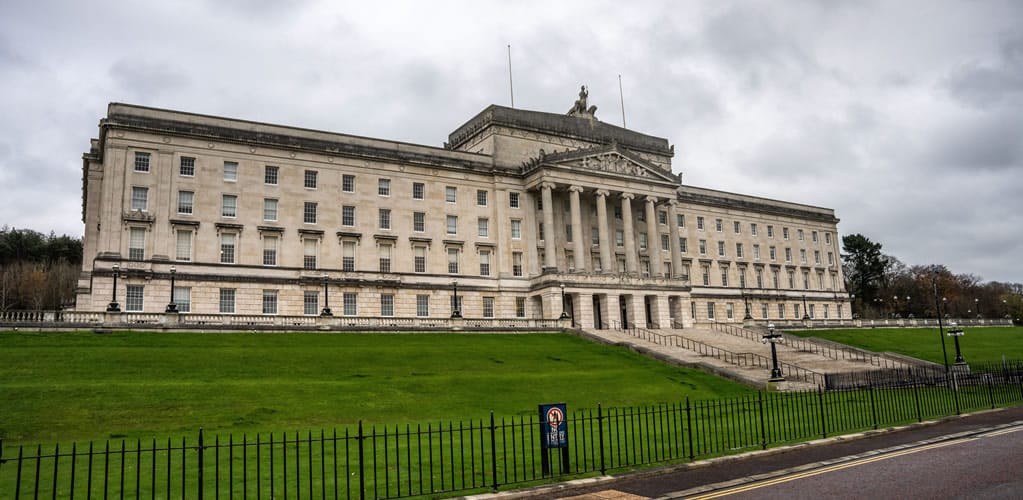Northern Ireland deal to restore power-sharing after two-year gap – how it happened and what comes next
DUP leader Jeffrey Donaldson ends nearly two years of power-sharing protest in Northern Ireland, aiming for a deal with Sinn Féin and UK government concessions on Brexit-related checks. Challenges and symbolism complicate the return to governance.

DUP leader Jeffrey Donaldson ends nearly two years of power-sharing protest in Northern Ireland, aiming for a deal with Sinn Féin and UK government concessions on Brexit-related checks. Challenges and symbolism complicate the return to governance.
T he Democratic Unionist party (DUP) leader, Jeffrey Donaldson, has finally moved to restore power sharing in Northern Ireland after nearly two years of protest.
The DUP, which has the second most seats in the Northern Ireland Assembly, collapsed the government in February 2022 over the terms of the Brexit deal. Many unionists felt that the checks on trade between Great Britain and Northern Ireland served to separate the region from the UK, and so undermined the Union.
UK Prime Minister Rishi Sunak attempted to address these concerns via the “Windsor framework”, negotiated with Brussels last spring. This agreement minimised checks on goods coming into Northern Ireland. But the DUP insisted that the UK government had not addressed all of its concerns, and power-sharing remained in abeyance.
Now, after months of further talks, Donaldson has decided that he has won enough concessions (or that he will not get any more). He has made clear his intent to lead the DUP back into power-sharing with Sinn Féin, the largest party in the assembly, after agreeing a deal with the UK government.
What’s likely to be in the deal?
Details have not been released, but Donaldson claims it will further limit checks on goods entering Northern Ireland, and the extent to which the region follows EU law. Both of these elements were part of the original Brexit deal, which was designed to avoid the UK’s departure from the EU creating a “hard border” in Ireland. Such an outcome would have destabilised the Good Friday Agreement and Northern Ireland peace process.
Donaldson also claims that the UK government will now pass legislation that will “strengthen the union”. This is his main tool to reassure unionist voters.
Any legislation passed by the UK government that affects Northern Ireland’s constitutional position will have to be consistent with the Good Friday Agreement. If it is not, there will be protests from the nationalist community. And any changes to the rules on goods entering Northern Ireland would need to be consistent with the Brexit deal and Windsor framework – otherwise the EU will be in opposition.
This might suggest that such changes are largely cosmetic, likely already approved by Brussels, or are practical changes that primarily address traders’ complaints about the complexity of the existing arrangements, but which also can be sold as gains for Donaldson.
Political fallout
But none of this will go through without fierce debate, particularly within unionism. Even the DUP meeting that led to the announcement of Donaldson’s deal was a fraught affair, the location kept secret from party members until three hours before in order to avoid a media melee and loyalist protests.
Donaldson still has a significant challenge ahead to convince the wider unionist community that his deal really is a significant improvement on current arrangements.
His task will not be aided by the fact that the DUP will be returning to power-sharing with Sinn Féin now holding the position of the first minister. The DUP’s travails over Brexit have seen a fall in its support, so the party can now only claim the role of deputy first minister. In practical terms, these roles have equal power, but even titular subservience to republicanism is ideological anathema to many unionists.
Symbolism remains important in Northern Ireland politics, and Sinn Féin’s Michelle O’Neill, leading the Belfast Assembly as first minister, would powerfully signal the end to what unionists once claimed was a “Protestant parliament for Protestant people”.
What happens next?
The UK government is expected to publish the details of the deal on Wednesday, with legalisation following on Thursday. The Stormont Assembly could then be called as early as Friday, when a new speaker would be elected. This, in turn, would allow eligible parties to nominate their ministers to the power-sharing executive, as per the rules of the Good Friday Agreement.
We can be certain that Donaldson will not be the DUP’s nomination as deputy first minister, as he leads the party as an MP in Westminster and does not currently sit in the Stormont Assembly.
Donaldson’s decision
Donaldson has clearly decided that it is more damaging to unionism, and to Northern Ireland’s future, to remain in constant protest. The absence of government for two years has seen further pressures mounting on the public sector particularly.
Workers striking over continued pay erosion have recently directed their protests towards the DUP, particularly as the UK government offered a £3 billion support package to help address wage claims in an effort to restore power-sharing.
However, there was also debate within the Conservative Party over whether the British government might soon abandon these efforts, suspend devolution to Northern Ireland, and run the region directly from Westminster.
Under the terms of the Good Friday Agreement, that would mean the Irish government would have a say in Northern Ireland’s affairs, and recent opinion polls have suggested that Sinn Féin could soon take power in the Republic for the first time. Donaldson might tell unionists it is better to share power with Sinn Féin in Belfast rather than accepting their dictates from Dublin.
He will certainly argue that unionism must do more than protest, and instead become proactive to protect its voice and interests. But many unionist leaders have tried the same before, and all have been ousted at some point.
And Donaldson acts from a position of weakness, with unionists no longer holding a majority in the Belfast Assembly for the first time in its history. He will need exceptional political skill to avoid the fate of his predecessors.






[Read our Comments Guidelines]